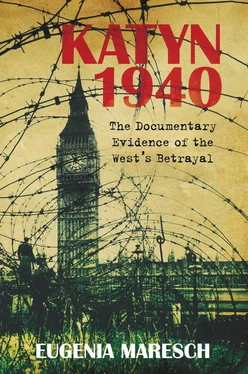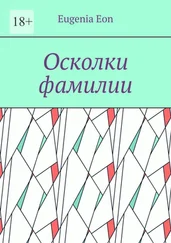Ambassador O’Malley’s Involvement with Katyn
There is no doubt that all the relevant documentation on the missing officers as well as the official and non-official reports on the massacre itself, came from Polish sources. The British Ambassador to the Polish government, Owen O’Malley, wrote a striking despatch 51, on 24 May 1943. [7] TNA FO 371/ 34577 C6160/258/55 a typescript of nine pages, despatch no 51, written by O’Malley 24 May 1943 with additional annexes and enclosures no 52; SPP Studium Polski Podziemnej (Polish Underground Movement Study Trust) A.7.1.1.deciphered signal sent 13 May 1943; FO 688/31/9 C6160/G; PREM 3/353.
Based on a Polish signal from ‘Kalina’ Gen. Stefan Rowecki, Commander of the AK , it included a transcribed report of Dr Adam Schebesta, chief medical officer and one of the PCK members who went to Katyn to inspect the graves. It reveals the state of the graves and possible number of the dead, their documents and diaries, all ending in April 1940. O’Malley refers to this report as ‘unauthorised’, it should be treated as most secret and should not be referred to by the British. Presumably he got it from Lt Col Michał Protasewicz, head of Oddział VI , the Polish Special Operations Bureau of the Polish General staff. Somehow a sentence on the German bullets found in the graves, marked GECO , was erased from the English version, with dire consequences, as O’Malley, who took on the challenge of Katyn with the FO, was ignorant of this while preparing his second report.
O’Malley’s despatch with attachments was read successively by the senior Foreign Office staff, amongst them: Sir William Strang, Sir Orme Sargent, [8] Orme Sargent (1884–1962) Third Secretary FO 1911, Second Secretary in Berne 1917 First Secretary and Peace Delegate to Paris in 1919; Deputy Assistant Under Secretary of State posted to Paris, made CMG in 1925, Counsellor at FO 1926; Assistant Under Secretary of State 1933, CB 1936, KCMG 1937, promoted to Deputy Under Secretary of State in 1939; Permanent Under Secretary of State 1946, made KCB in 1947, GCMG in 1948, retired in 1949.
Sir Alexander Cadogan, Frank Roberts, and eventually by Denis Allen. [9] William Denis Allen (1910–1987) Third Secretary in the FO 1934, on Far East staff, Chargé d’ Affaires in Chunking 1942, FO during war time, First Secretary 1944, transferred to Washington in 1946, back in London head of German Political Department until 1949, Counsellor 1949–1953, made CMG 1950, Ambassador in Ankara till 1963, Deputy Under Secretary of State to 1967, retired in 1968. The quote is from FO 371/34577 C 6160/258/55.
The Foreign Secretary Anthony Eden passed it over to Churchill, who after reading it wanted to know if the despatch had been sent to the King and the President – not the President, Eden replied, as he considered it to be ‘pretty explosive and in some respects prejudicial’. Eden feared that ‘if it fell into unauthorised hands then the reaction on the relations with Russia would be serious’. Nevertheless, Churchill sent a copy of O’Malley’s despatch to President Theodore Roosevelt on 13 August 1943 with a note that the first two pages were ‘grim’ but it was a well written story; and he asked for its return! Denis Allen, the geographical desk officer at the FO, as well as Sir Alexander Cadogan expressed their opinions, which would shape Katyn’s course.
British Embassy to Poland
45 Lowndes Square S.W.1
(No. 51)
(15/192/43) May 24th 1943.
Sir,
My despatch No.43 of April 30th, dwelt on the probability that no confederation in Eastern Europe could play an effective part in European politics unless it were affiliated to the Soviet Government, and suggested that so long as the policy of this Government was as enigmatic as it now is, it would be inconsistent with British interests that Russia should enjoy a sphere of influence extending from Danzing [Gdańsk] to the Aegean and Adriatic Seas. The suppression of the Comintern on May 20th may be considered to have brought to an end what was in the past the most objectionable phase of Soviet foreign policy and to entitle the Soviet Government to be regarded less distrustfully than formerly. [10] At a Presidium meeting of 8 June 1943, it was decided to dissolve the Comintern, an International worker’s organisation, as of 10 June 1943.
It is not, then, without hesitation that I address this further despatch to you which also gives grounds for misgivings about the character and policy of the present rulers in Russia.
2. We do not know for certain who murdered a lot of Polish officers in the forest of Katyn in April and May 1940, but this at least is already clear, that it was the scene of terrible events which will live long in the memory of the Polish nation. Accordingly, I shall try to describe how this affair looks to my Polish friends and acquaintances of whom many had brothers and sons and lovers among those known to have been taken off just three years ago from the prison camps at Kozielsk, Starobielsk and Ostashkov to an uncertain destination: how it looks, for instance, to General Sikorski, who there lost Captain [Jan] Fuhrman, his former ADC and close personal friend; to M. [Kajetan] Morawski, who lost a brother-in-law called Zoltowski [Adam Żółtowski] and a nephew; or to M. [Lt Col Adam] Zaleski, who lost a brother and two cousins. (See Annex I).
3. The number of Polish prisoners taken by the Russian armies when they invaded Poland in September 1939 was about 180,000, including police and gendarmerie and a certain number of civilian officials. The total number of army officers was around about 15,000. At the beginning of 1940 there were in the three camps named above round about nine or ten thousand officers and six thousand other ranks, policemen and civil officials. Less public reference has been made to these 6,000 than to the 10,000 officers, not because the Polish Government are less indignant about the disappearance of other ranks than about the disappearance of officers, or were less insistent in enquiries for them, but because the need of officers to command the Polish troops recruited in Russia was more urgent than the need to increase the total ration strength of the Polish army. There is no reason to suppose that these 6,000 other ranks, police and civilians were treated by the Soviet Government differently to the officers and mystery covers the fate of all. For the sake of simplicity however, I shall write in this despatch only of the missing officers without specific reference to other ranks, to police prisoners or to civilians. Of the 10,000 officers, only some 3 or 4,000 were regular officers. The remainder were reserve officers who in peace time earned their living, many with distinction, in the professions, in business and so on.
4. In March of 1940 word went around the camps at Kozelsk, Starobelsk and Ostashkov that under orders from Moscow the prisoners were to be moved to camps where conditions would be more agreeable, and that they might look forward to eventual release. All were cheered by the prospect of a change from the rigours which prisoners must endure to the hazards and vicissitudes of relative freedom in Soviet or German territory. Even their captors seemed to wish the prisoners well who were now daily entrained in parties of 50 to 350 for the place at which, so they hoped, the formalities of their discharge would be completed. As each prisoner was listed for transfer, all the usual particulars about him were re-checked and re-registered. Fresh fingerprints were taken. The prisoners were inoculated afresh and certificates of inoculation furnished to them. Sometimes the prisoners’ Polish documents were taken away, but in many such cases these were returned before departure. All were furnished with rations for the journey, and, as a mark of special regard, the sandwiches furnished to senior officers were wrapped in clean white paper – a commodity seldom seen anywhere in Russia. Anticipations of a better future were clouded only by the fact that 400 or 500 Poles had been listed for further detention, first at Pavlishchev Bor and eventually at Griazovets. These were, as it turned out later, to be the only known survivors of the lost legion, and some of them are in England now; but at the time, although no principle could be discovered on which they had been selected, they supposed they had been condemned to a further period of captivity; and some even feared that they have been chosen out for execution.
Читать дальше












